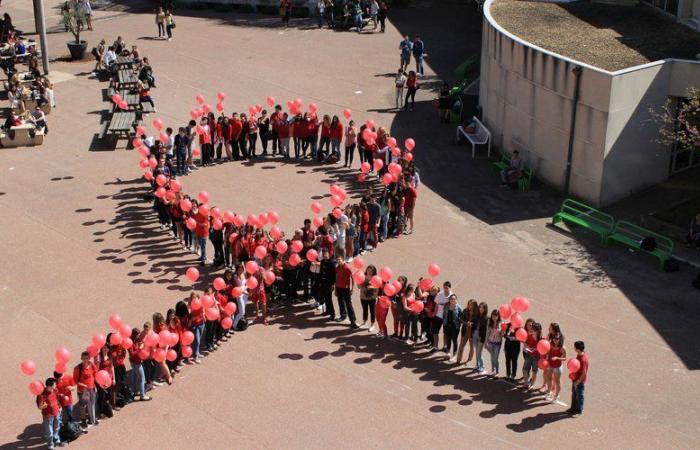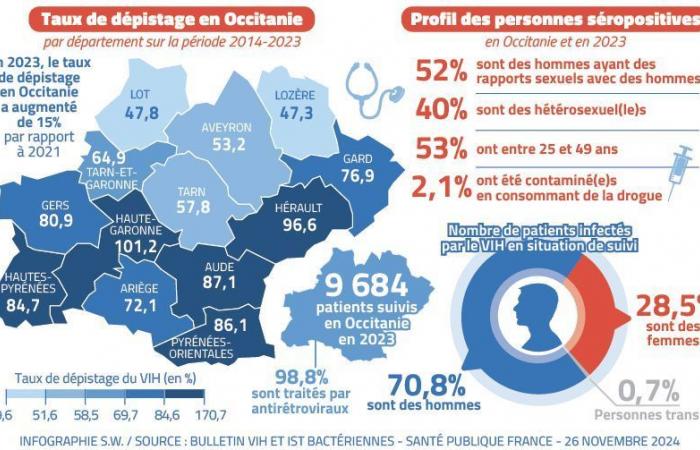Professor of infectious medicine at Montpellier University Hospital, Alain Makinson is also president of Corevih, the regional reference organization for those fighting STIs (sexually transmitted infections) and HIV, and coordinator of “Montpellier without AIDS”. It analyzes the results for the year 2023: + 5,473 new cases in France, + 320 in Occitanie.
In Occitania, nearly 10,000 people live with HIV infection.
Midi Libre – TANYA CONTRERAS
What does the state of play of the past year, in France and Occitanie, say about HIV contamination?
There is a plateau between 2012 and 2019, a drop in 2020 because there is under-screening due to confinements, and less interactions between countries, and a re-increase in the number of discoveries since.
For what ?
This is due to the resumption of screening, and this could be good news, but perhaps there is also an epidemiological rebound among people furthest from care, and the resumption of international trade.
In France, between 2020 and 2023, there will be +12% new discoveries of HIV infections. This is 5,473 new cases in 2023, according to estimates from Public Health France. We have had 10,000 new cases for years. But in 2023, it is estimated that 11,000 people did not know their status, this is where we take risks.
The 2023 results in Occitania
Published on November 26, the Public Health France (SPF) bulletin on sexually transmitted infections and HIV reports 319 discoveries of new infections in 2023, in a context of increased use of screening: 4,600 self-tests sold in pharmacies, 1,000 distributed by associations, 3176 TRODs (rapid diagnostic orientation tests, carried out by associations in community settings) used, screening without a prescription in laboratories, etc.
More than 10 million condoms were sold in the region in 2023.
SPF estimates that 602 people are unknowingly infected.
In total, 9,684 people were living with HIV in 2023. The vast majority (92.4%) had an undetectable viral load.
Contaminations “are decreasing sharply” among MSM (men who have sex with men) born in France, who remain the first population affected: 238 cases. They are “stable” among heterosexuals born in France (142 cases) and increase slightly among heterosexuals (137 cases) and MSM (62 cases) born abroad, 41% of whom become infected upon their arrival in France.
Is this worrying?
We’ll see if it continues to rise. With all the prevention tools we have, PrEP, condoms, treatments that make it possible to no longer transmit the disease despite infection, screening tools… despite all these efforts, we cannot reduce the incidence in all populations at risk.
Whether in Occitanie or in France, we see that a lot of efforts have been made among men who have sex between men, MSM born in France, there is a drop in the number of cases per year.
On the other hand, for people born abroad, and in particular women and MSM, there is rather a re-increase in cases. We clearly see that prevention affects some populations better than others. There is an effort to be made on populations far from care. This is also the case, more generally, of young MSM who become sexually active and who do not know the prevention tools.
I want to emphasize the fact that negative serology is also an opportunity to practice prevention.
The emergency: “Sexual health education”
Is the situation in Occitania, which accounts for 10% of the national population, following the same trends?
We are looking at 320 discoveries in 2023, which is a little less. The situation is very heterogeneous, with more detections in urban and peri-urban environments. There has also been a significant decrease among MSM since 2018 but the incidence increases slightly among people born abroad.
How do you explain the regional disparities: the Pyrénées-Orientales is the department where the share of drug users is greater than elsewhere, even if it remains in the minority in HIV discoveries, Hérault, the one where there are more of MSM born in France, Haute-Garonne, the most heterosexuals born abroad…
It is linked to the sociology of territories. For us, this data is especially important to know who to contact for prevention.
HIV, STIs: screening without appointment and without prescription
Since September 1, 2024, “direct access to screening for four sexually transmitted infections, in addition to HIV, is possible at the request of the person without a prescription and without an appointment, in all medical biology laboratories,” recalls health insurance. HIV testing without a prescription was implemented in 2022. The STIs concerned are (in addition to HIV): hepatitis B, syphilis, gonorrhea and chlamydia. The system is “a big success”, notes Franck Marcé, at Sida info Service.
It’s not just HIV, what about the situation with other sexually transmitted infections?
There is a spread, including in the general population, of certain STIs among young people, such as chlamydia. We are at extremely high incidences: 85.1 per 100,000 in Occitanie, and up to 127 per 100,000 in Haute-Garonne, 105.5 per 100,000 in Hérault, mainly among young women aged 15-25 years.
For gonococcal infections, there is also an increase: we are at 52.2 per 1000 in Occitanie, compared to 44.2 in France. Among young women in Occitanie, it is 178.3, and the figure is increasing.
The condom is the best tool to prevent STIs. STIs are the leading cause of infertility in low-resource countries.
What is the emergency today?
Sexual health education is topical… We need to inform people about PrEP, which is not just for MSM, to re-inform young people about HIV and STIs, about vaccines, and about their use. condom. Inform and inform again. The Corevih will also transform into CoReSS, on broader sexual health issues.
Are we trivializing HIV too much?
There are still 130,000 people living with HIV in France, 40 million people in the world… There has been undeniable progress, but we must not relax.
Midi Libre – SOPHIE WAUQUIER







